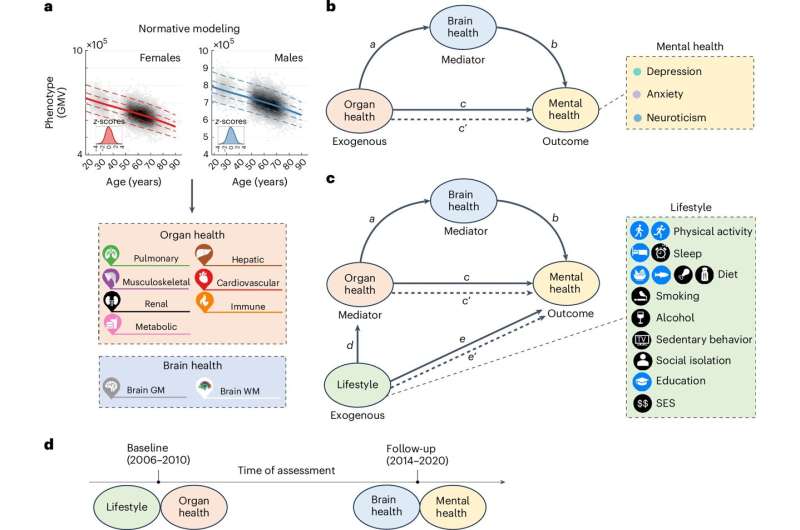This article has been reviewed according to Science X's editorial process and policies. Editors have highlighted the following attributes while ensuring the content's credibility:
fact-checked
peer-reviewed publication
trusted source
proofread
Pathways linking body and brain health and impacts to mental health revealed

The interconnectedness of the brain, body and lifestyle factors and how they collectively influence mental health has been demonstrated by new research.
Researchers from the University of Melbourne, University College London and the University of Cambridge have identified multiple biological pathways involving organs and the brain that play a key part in physical and mental health.
The study, published today in Nature Mental Health, used UK Biobank data from more than 18,000 people—7,749 people in the study had no major clinically diagnosed medical or mental health conditions, while 10,334 reported a diagnosis of either schizophrenia, bipolar disorder, depression or anxiety.
Using advanced statistical models, the researchers found poorer organ health was significantly associated with higher depressive symptoms, and that the brain plays an important role in linking body health and depression.
The organ systems studied included the lungs, muscles and bones, kidneys, liver, heart, and the metabolic and immune systems.
"Overall, we found multiple significant pathways through which poor organ health may lead to poor brain health, which may in turn lead to poor mental health," lead author Dr. Ye Ella Tian, research fellow in the Department of Psychiatry, said.
"By integrating clinical data, brain imaging and a wide array of organ-specific biomarkers in a large population-based cohort, we were able to establish for the first time multiple pathways involving the brain as a mediating factor and through which poor physical health of body organ systems may lead to poor mental health.
"We identified modifiable lifestyle factors that can potentially lead to improved mental health through their impact on these specific organ systems and neurobiology.
"Our work provides a holistic characterization of brain, body, lifestyle and mental health."
Physical health was also taken into account as well as lifestyle factors such as sleep quality, diet, exercise, smoking, and alcohol consumption.
"This is a significant body of work because we have shown the link between physical health and depression and anxiety and how that is partially influenced by individual changes in brain structure," Professor Andrew Zalesky from the Departments of Psychiatry and Biomedical Engineering said.
"Our results suggest that poor physical health across multiple organ systems, such as liver and heart, the immune system and muscles and bones, may lead to subsequent alterations in brain structure.
"These structural changes of the brain may lead to or exacerbate symptoms of depression and anxiety as well as neuroticism."
Professor James Cole, an author of the study from UCL Computer Science, said, "While it's well-known in health care that all the body's organs and systems influence each other, it's rarely reflected in research studies. So, it's exciting to see these results, as it really emphases the value in combining measures from different parts of the body together."
More information: Ye Ella Tian et al, Brain, lifestyle and environmental pathways linking physical and mental health, Nature Mental Health (2024). DOI: 10.1038/s44220-024-00303-4



















